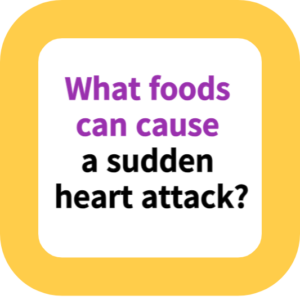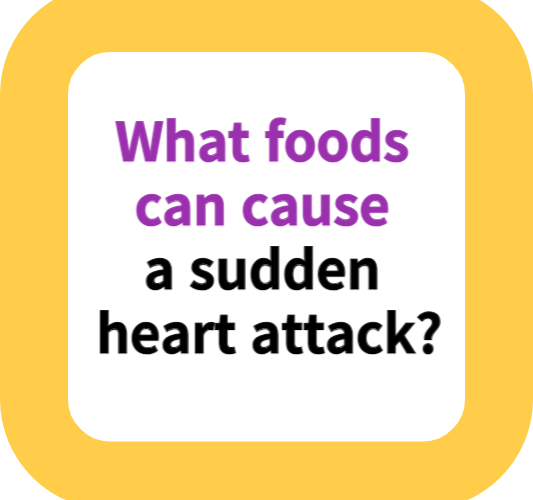What foods can cause a sudden heart attack?
Welcome to our blog, where we dive deep into the crucial link between diet, lifestyle, and heart health. In a world where heart attacks are a leading cause of mortality, understanding how our daily food choices and habits influence our heart’s well-being is more important than ever.
Our blog features a range of topics, from the risks associated with high intakes of saturated fats and cholesterol to the benefits of incorporating fruits and vegetables into your diet. We understand that managing heart health is not just about avoiding certain foods; it’s about creating a balanced and sustainable lifestyle.
That’s why we also focus on the importance of regular physical activity, managing stress, and making informed choices about alcohol consumption. Each post is crafted with care to provide practical, actionable advice that you can incorporate into your daily life.
Join us as we explore the fascinating world of heart health, bust common myths, and discover the keys to a long, vibrant life with a strong, healthy heart.
What foods can cause a sudden heart attack?

Introduction: Understanding the Impact of Diet on Heart Health
Heart attacks, a leading cause of death worldwide, are often closely linked to dietary habits. This comprehensive guide delves into various foods and dietary patterns that heighten the risk of heart attacks.
It aims to provide a clear understanding of how certain foods affect heart health and offers advice on maintaining a heart-healthy lifestyle.
The Role of Saturated Fats and Cholesterol
Foods high in saturated fats and cholesterol, such as red meats, egg yolks, and full-fat dairy products, are primary contributors to arterial plaque formation.
This plaque buildup is a significant factor in heart attacks, as it narrows arteries and impedes blood flow. Monitoring and reducing the intake of these foods can be a critical step in safeguarding heart health.
Salt Intake and Its Effects on Blood Pressure
Excessive consumption of salt is directly linked to increased blood pressure, a leading cause of heart attacks and strokes. Foods high in salt content, like processed meals and restaurant dishes, put undue strain on the heart by forcing it to work harder to circulate blood. Managing salt intake is essential in maintaining healthy blood pressure levels.
Obesity: A Major Risk Factor for Heart Disease
Obesity is intricately linked with an increased risk of heart diseases. It acts as a catalyst for other health issues like hypertension, diabetes, and elevated cholesterol levels, all of which are precursors to heart disease.
A focus on achieving and maintaining a healthy weight through balanced diet and regular exercise is crucial in preventing heart-related complications.
The Impact of Alcohol on Heart Health
Alcohol, especially when consumed in excess, can lead to direct damage to the heart muscle. This damage increases the risk of heart diseases and strokes. Moderation in alcohol consumption is essential, and individuals with pre-existing heart conditions should seek medical advice regarding alcohol use.
High Dietary Cholesterol and Heart Disease
A diet rich in foods with high levels of dietary cholesterol, such as certain meats and dairy products, can lead to increased blood cholesterol. Elevated cholesterol levels contribute to the risk of developing heart diseases. Opting for low-cholesterol food options is advisable for heart health.
Fruits and Vegetables: Essential for Heart Health
A diet lacking in fruits and vegetables deprives the body of essential nutrients, fibers, and antioxidants. These elements play a significant role in reducing blood pressure, mitigating inflammation, and preventing heart diseases. Including a variety of fruits and vegetables in the diet is key to heart health.
Processed Foods: A Threat to Heart Health
Processed and packaged foods often contain high levels of sodium, unhealthy fats, and added sugars, all of which are detrimental to heart health. Avoiding or limiting the consumption of these foods can substantially reduce the risk of heart diseases.
Physical Activity: A Pillar of Heart Health
Regular physical activity is as important as diet in preventing heart diseases. Exercise helps in managing weight, reducing blood pressure, and improving overall cardiovascular health. Incorporating a routine of moderate physical activity can significantly benefit heart health.
Conclusion: A Holistic Approach to Preventing Heart Attacks
While no specific food combination can directly cause a heart attack, a diet high in saturated and trans fats, sodium, and sugars, combined with a sedentary lifestyle, significantly raises the risk of heart disease.
Embracing a holistic approach that includes a balanced diet, regular physical activity, and healthy lifestyle choices is paramount in reducing the risk of heart attacks and enhancing overall heart health.
Regular check-ups and personalized advice from healthcare providers are also recommended for heart disease prevention and management.
